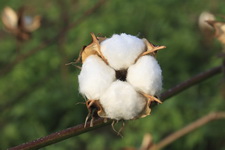
Biotech and Traditional Farming are Compatible Approaches to Sustainable Agri, Study
January 7, 2015| |
 A new international study led by Chinese scientists and Bruce Tabashnik at the University of Arizona suggests that biotech crops and traditional farming practices can be compatible approaches to sustainable agriculture.
A new international study led by Chinese scientists and Bruce Tabashnik at the University of Arizona suggests that biotech crops and traditional farming practices can be compatible approaches to sustainable agriculture.
The team discovered that the diverse patchwork of crops in northern China slowed adaptation to genetically engineered cotton by the cotton pest bollworm. Tabashnik used computer model simulations to project the consequences of different assumptions about the use of refuges in northern China, where such refuges have not been required. The Chinese believe that refuges of non-Bt cotton are not needed because the cotton bollworm feeds on many crops other than cotton. The results of the new study provide the first evidence that these "natural refuges" of non-Bt crops delay the evolution of pest resistance to Bt cotton.
Tabashnik said, "Natural refuges help but are not a permanent solution. The paper indicates that if the current trajectory continues, more than half of the cotton bollworm population in northern China will be resistant to Bt cotton in a few years." The team recommends switching to cotton that produces two or more Bt toxins and integrating Bt cotton with other control tactics, such as biological control by predators and parasites.
Tabashnik adds, "The most important lesson is that we don't need to choose between biotechnology and traditional agriculture. Instead, we can use the best practices from both approaches to maximize agricultural productivity and sustainability."
For more, read the news release at http://uanews.org/story/ancient-wisdom-boosts-sustainability-of-biotech-cotton.
| |
Biotech Updates is a weekly newsletter of ISAAA, a not-for-profit organization. It is distributed for free to over 22,000 subscribers worldwide to inform them about the key developments in biosciences, especially in biotechnology. Your support will help us in our mission to feed the world with knowledge. You can help by donating as little as $10.
-
See more articles:
-
News from Around the World
- FAO: Global Efforts Needed to Stop Deadly Banana Disease
- Biotech and Traditional Farming are Compatible Approaches to Sustainable Agri, Study
- Kenya Bets on High Value Sorghum to Boost Yields
- Training for Faculty of Agriculture With Nanotech Company in Egypt
- New Study Provides Better Understanding of the Genetic Basis for Drought Tolerant Soybeans
- Wheat Gene Increases Blight Resistance of American Chestnut Trees
- USDA Clears GM Tall Fescue
- Report: Weed Control Changes and Herbicide Tolerant Crops in the USA 1996-2012
- Book on GM Crops' Myths and Facts Released in India
- China Approves Imports of Biotech Crops
- Study Shows European Consumers' Attitudes towards Cisgenic Rice
-
Research Highlights
- Effect of the ahas Transgene on Biological Nitrogen Fixation and Yield of Soybean
-
Beyond Crop Biotech
- Scientists Map Loops in Human Genome
-
From the BICs
- IndoBIC Concludes Seminar on Stewardship of Late Blight Resistant Potato in Bogor
- IndoBIC Holds Media Visit to Seed Industries in East Java
-
Read the latest: - Biotech Updates (February 18, 2026)
- Gene Editing Supplement (January 28, 2026)
- Gene Drive Supplement (February 22, 2023)
-
Subscribe to BU: - Share
- Tweet
